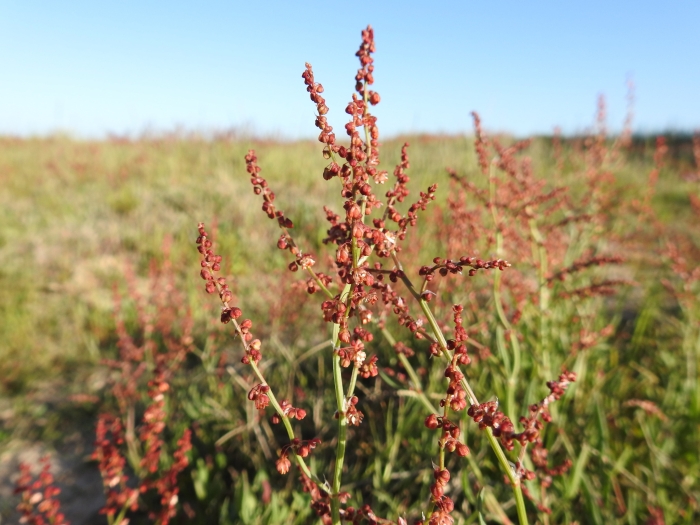Red Sorrel
(Rumex acetosella)
Red Sorrel (Rumex acetosella)
/
/

© Paul Emms
CC BY-SA 4.0
Image By:
© Paul Emms
Recorded By:
Copyright:
CC BY-SA 4.0
Copyright Notice:
Photo by: © Paul Emms | License Type: CC BY-SA 4.0 | License URL: http://creativecommons.org/licenses/by-sa/4.0/ | Uploader: emmspaul | Publisher: iNaturalist |





Estimated Native Range
Summary
Rumex acetosella, commonly known as red sorrel or sheep’s sorrel, is a perennial herb that is native to a variety of habitats across Eurasia and the British Isles, including open woodlands, grasslands, and heathlands. It is particularly well-adapted to acidic, sandy soils and often colonizes disturbed areas. The plant typically grows to a height of 18 inches (45 cm) and has a spreading habit due to its rhizomatous root system. It features distinctive green, arrowhead-shaped leaves and red-tinted stems, with small maroon female flowers that appear in early summer. The flowers are not particularly showy but are interesting upon close inspection.
Red sorrel is valued for its culinary uses, as the leaves have a tart, lemony flavor and can be used in salads or as a garnish. It is also used in traditional medicine for its potential health benefits. In cultivation, it requires minimal care, thriving in full sun to part shade and tolerating a range of soil types, though it prefers well-drained, sandy soils. While it can be an attractive addition to herb gardens, it is important to manage its spread to prevent it from becoming invasive. Gardeners should be aware that Rumex acetosella contains oxalates, which can be toxic to livestock in large quantities. It is also potentially invasive in some regions outside its native range, so it is advisable to check local regulations before planting.CC BY-SA 4.0
Red sorrel is valued for its culinary uses, as the leaves have a tart, lemony flavor and can be used in salads or as a garnish. It is also used in traditional medicine for its potential health benefits. In cultivation, it requires minimal care, thriving in full sun to part shade and tolerating a range of soil types, though it prefers well-drained, sandy soils. While it can be an attractive addition to herb gardens, it is important to manage its spread to prevent it from becoming invasive. Gardeners should be aware that Rumex acetosella contains oxalates, which can be toxic to livestock in large quantities. It is also potentially invasive in some regions outside its native range, so it is advisable to check local regulations before planting.CC BY-SA 4.0
Plant Description
- Plant Type: Herb
- Height: 0.3-1.5 feet
- Width: 0.3-0.5 feet
- Growth Rate: Rapid
- Flower Color: Red, Green
- Flowering Season: Spring, Summer, Fall
- Leaf Retention: Deciduous
Growth Requirements
- Sun: Full Sun
- Water: Medium
- Drainage: Fast
Common Uses
Edible*Disclaimer: Easyscape's listed plant edibility is for informational use. Always verify the safety and proper identification of any plant before consumption., Erosion Control, Low Maintenance
Natural Habitat
Native to a variety of habitats across Eurasia and the British Isles, including open woodlands, grasslands, and heathlands
Other Names
Common Names: Sheep’s Sorrel, Sour Weed, Field Sorrel, Red Sorrel
Scientific Names: , Rumex acetosella, ? vulgaris, Acetosella multifida subsp. pyrenaica, Acetosella tenuifolia, Pauladolphia acetosella, Rumex acetosella f. acetosella, Rumex acetosella var. procurrens, Rumex acetosella var. pyrenaicus, Rumex acetosella var. pyrenaicus
GBIF Accepted Name: